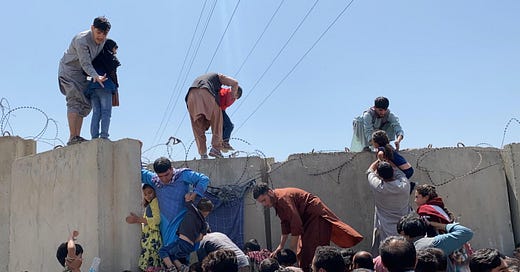S2E2. Escaping Afghanistan
As the Taliban seized control over Kabul, thousands of citizens are seeking refuge abroad. Three Balkan countries have opened their doors to refugees, waiting for Europe's decision
Hi,
welcome back to BarBalkans, the newsletter with blurred boundaries.
Kabul has fallen.
Afghanistan has become an Islamic Emirate.
Twenty years after the beginning of the U.S. invasion, the Taliban have regained control of the country with the greatest of ease.
Thousands of citizens are trying to flee in any possible way. The pictures show a desperate situation.
It is now inevitable to expect an Afghan exodus, but it is difficult to estimate its size for now.
The time has come for Europe to make his move to recognize international protection to displaced Afghans.
Meanwhile, three Balkan countries have sent a clear message.
This will be a newsletter to read all in one breath.
A brief summary
If you missed a step along the way, or if you need a concise overview of the events that let the Taliban seize control over Kabul, you are in the right place.
All this traces back to September 11 attacks in New York and Washington by Al-Qaeda terrorists.
George W. Bush’s Administration decided to invade Afghanistan, ruled by the Taliban since 1996 and where Osama bin Laden, head of Al-Qaeda, found refuge.
It was October 7, 2001.
Within a month, Kandahar and Kabul fell: the Islamic Emirate collapsed.
On March 1, 2003, the U.S. declared the end of the fighting. The mission to rebuild Afghanistan began.
Hamid Karzai won the democratic elections and became Afghanistan’s first president on October 9, 2004. The Western world believed the mission to “export democracy” succeeded.
But from the south and across the Pakistani border the Taliban guerrilla did not stop. Over the years, the U.S. and NATO armed forces increased.
On May 1, 2011, Osama bin Laden was killed by U.S. Special Forces in Abbottabad (Pakistan).
Discussions began about the withdrawal of Western troops and the transfer of responsibility to the Afghan army for the country’s security.
The United States has spent over 83 billion dollars on training the Afghan army. 20 years of the mission cost 2.000 billion.
In 2018 Donald Trump’s Administration began the negotiations with the Taliban. The Agreement for Bringing Peace to Afghanistan was signed on February 29, 2020.
The agreement enshrined the gradual withdrawal of the U.S. and NATO military disengagement, in exchange for a ceasefire and the Taliban engagement in dialogue with the government of Ashraf Ghani.
Neither the first nor the second promise by the Taliban was really kept.
Meanwhile, the withdrawal of Western troops - that began on May 1, 2021 under Joe Biden’s Administration - has not gone with Afghan army’s resistance.
On the contrary, it collapsed immediately. At the beginning of August, the cities of Zaranj, Kandahar and Herat fell within a few days.
Kabul was expected to resist for at least a month and a half. Instead, on August 15 the Taliban entered the capital without firing a single bullet.
Thousands of citizens rushed into Kabul International Airport, trying to flee the country.
The scenes are dreadful. In a desperate bid to escape, people clung to departing military planes, even to wheels and wings, or were packed into military cargo planes.
While the Taliban were announcing a new regime inspired by Sharia law, Afghan citizens have kept seeking a way out throughout the week, until today.
As the subject is very broad, I suggest you some readings:
Why Both Russians and Americans Got Nowhere in Afghanistan, Bloomberg
As Afghanistan falls, what does it mean for the Middle East?, The Conversation
What Scenes From the Taliban’s Victory in Afghanistan Reveal, The New York Times
Who are the Taliban and how did they take control of Afghanistan so swiftly?, CNN
The Taliban’s return is catastrophic for women, The Atlantic
China will tread carefully in navigating the Taliban’s return, The Guardian
The world must be ready for the Afghan exodus, Financial Times
Balkan refuge
Albania, Kosovo and North Macedonia.
Just a few hours after the dramatic scenes from the Kabul International Airport, the three Balkan countries decided to shelter Afghan political refugees.
«Undoubtedly, we will not say no. Not only because our allies are asking this, but because we are Albania», Prime Minister, Edi Rama, stated from Tirana.
«Kosovo respects the international law and obligation not to close the door to refugees», President of Kosovo, Vjosa Osmani, echoed.
Macedonian Prime Minister, Zoran Zaev, added: «We are a country of solidarity. Our people and our society have always given support and help, in the same way as we have been receiving help during major catastrophes».
Tirana, Pristina and Skopje are ready to temporarily shelter a limited number of Afghan citizens who are suffering retaliation by the Taliban (even if they promised general pardon), as they cooperated with NATO forces.
The final destination will be the United States.
But first, they will have to be hosted by another country for at least one year, while their papers for entering the U.S. are finalized.
According to the preliminary estimates, 250 people will be hosted in Albania, about 390 in North Macedonia, while it is still unclear for Kosovo.
In an interview for Balkan Investigative Reporting Network Adrian Shtuni, specialist in counter-terrorism in the Western Balkans, noted that «the financial costs will be contained» for the countries of transit and covered by the United States.
Moreover, «from a security perspective, there is no reason to believe the contingent of Afghan refugees would present a risk. These are interpreters and contractors, not former fighters or militants».
The move by the three Balkan governments is twofold: «It is as much a sign of moral leadership and humanitarian compassion» as it is «a confirmation that are reliable partners» for the United States and NATO.
Not to mention possible economic and political benefits. Kosovo could be particularly interested in it.

In Albania, the experience of sheltering refugees from the Middle East is well known.
Near the small former miners’ village of Manëz (Durres), Ashraf-3 camp hosts about 3,000 men and women of the People’s Mujahedin of Iran organization.
The party is outlawed in the Islamic Republic of Iran and for years was on the international blacklist of terrorist organizations. It fights from abroad for a secular and social-democratic society against the theocratic regime.
Due to persecution in Iran, the Mujahedin first sought refuge in Iraq. But in 2013, Barack Obama’s Administration planned to relocate them to Albania.
All this was arranged by a secret agreement with the former Albanian Prime Minister, Sali Berisha.
The story of the 3,000 Iranian refugees in Durres was accurately reported by Courrier des Balkans.
To these, the stories of civilians fleeing from neighboring Afghanistan will have to be added soon.
It’s up to Europe
At the same time as the three countries are making arrangements to shelter political refugees, someone in the Western Balkans is swimming against the tide.
«Montenegro feels not obliged to temporarily accept the residents of Afghanistan who helped allied forces», Foreign Minister Đorđe Radulović specified.
And now a profound question arises.
Montenegro supported a statement in which 99 countries called on the Taliban authorities «to respect and facilitate the safe and orderly departure of foreign nationals and Afghans who wish to leave the country».
Not only local staff who helped NATO forces over the past 20 years «deserve to live in safety, security and dignity», but all Afghan people.
Another joint statement was released in the same spirit:
«We are deeply worried about Afghan women and girls, their rights to education, work and freedom of movement. We stand ready to assist them with humanitarian aid and support, to ensure that their voices can be heard».
But in addition to humanitarian aid and support, the time has come to create humanitarian corridors for Afghan refugees.
Europe has been having a huge problem with Afghan refugees since before the Taliban regained power.
This is shown by Eurostat data.
From 2008 to 2020, almost half of the Afghan asylum seekers were rejected by European countries (290,000). One out of four rejected asylum applicants was repatriated (70,000).
According to Europe, Afghanistan was not an unsafe country. However, we have known for years that the refugees deported by Europe were attacked by the Taliban.
Only eight European countries granted protection to more than 60% of them.
Who were these 290,000 rejected Afghan refugees?
One out of five was a woman. More than 25 thousand were girls, out of 71,250 children under the age of 18.
Almost 190,000 adult men were rejected.


The need to start a profound discussion on refugee flow from Afghanistan is gaining momentum in Brussels.
The EU High Representative of the Union for Foreign Affairs and Security Policy, Josep Borrell, warmed up to the possibility of using for the first time the Temporary Protection Directive (adopted in 2001).
This is an is an exceptional measure to provide immediate protection to displaced persons who are unable to return to their country of origin. It applies when there is a risk that the standard asylum system is struggling to cope with demand stemming from a mass influx.
Its origins can be traced back to the conflicts in former Yugoslavia in the Nineties, which demonstrated the need for special procedures to deal with mass influxes of displaced persons.
However, Borrell was immediately contradicted by an EU Commission spokesperson: «We have proposed to repeal and replace it with a new, better-designed regulation».
It must be said that the European Commissioner for Home Affairs, Ylva Johansson, at the end of the extraordinary summit with the 27 EU Ministers on Wednesday 18 August, also admitted that «we are preparing for all scenarios».
In a press statement, she reiterated that «evacuation of EU staff and citizens and local staff who have been working with the EU and the Member States in Afghanistan is an immediate priority».
But considering that the «instability in Afghanistan is likely to lead to increased migratory pressure», the Commissioner also made a point about refugees.
First of all, efforts will be made to support programmes linked to displacement in neighbouring countries (Iran and Pakistan). «We should prevent people from heading towards the European Union through unsafe and irregular routes run by smugglers».
But there is more. «As things stand, the situation in Afghanistan is clearly not safe and it will not be safe for some time», Johansson stressed. «Therefore we cannot force people to return to Afghanistan».
This means that a shared solution among EU Member States will have to be found for asylum seekers. And this time, time is running out.

There is already something that can be done, even now.
Several MEPs have recalled it in recent days, in particular Italian S&D MEPs who went on a mission in January to the Croatian border with Bosnia and Herzegovina, where illegal pushbacks against migrants take place.
In the refugee camps of Bosnia - Lipa and many others - we are leaving thousands of people in shameful living conditions.
In 2020 they represented more than a third of all asylum seekers along the Balkan route (out of more than 50,000).
BarBalkans reported in January that on the Bosnian border all of us, the first-class Europeans, have to deal with our own failings.
Only now that the Taliban regained power, Afghanistan seems no longer so safe.
There is still time to act. We must demand decisive action from our national governments and the European Union as a whole.
All it takes is to look towards the Western Balkans and start facing the issues that we have been confining to the back door of Europe for years.
Pit stop. Sittin’ at the BarBalkans
We have reached the end of this piece of road.
It is very difficult to find the right words today. So I ask you to forgive me for deviating from our usual Balkan recommendation.
I would rather tell you about one of the many Afghan stories of women empowerment, which now will be canceled by Taliban fundamentalism.
The story of those cafés in Kabul that evolved into symbols of progress.
Unlike restaurants, which have separate areas by gender, in new cafés that have sprung up in recent years women can sit with men.
In 2014 the Taliban launched a series of attacks and suicide bombings. It is no coincidence that the deadliest one killed 21 customers in the famous café Taverna du Liban, where alcohol was served and Afghan men and women mingled among Westerners.
Following a period of fear, new cafés began to open in the centre of the capital, welcoming young women and men who want to feel free in public.
In 2018, 30-year-old Mina Rezaee opened Simple Café in Kabul. Until now, she has made sure every day no one harasses her female customers for wearing trendy clothes, for sitting with men, or wearing no veil.
«Women make the culture here, not men», Rezaee stated in an interview with The New York Times. «It’s the Taliban who needs to change their ideology, not us. That’s my red line».
Let’s continue the BarBalkans journey. We will meet again in a week, for the 3rd stop.
A big hug and have a good journey!
BarBalkans is a free weekly newsletter. Behind these contents there is a lot of work undertaken.
If you want to help this project to improve, I kindly ask you to consider the possibility of donating. As a gift, every second Wednesday of the monthyou will receive a podcast with an article about the dissolution of Yugoslavia.
Every month you can listen to the preview of BarBalkans - Podcast on Spreaker and Spotify.
Pay attention! The first time you will receive the newsletter, it may go to spam, or to “Promotions Tab”, if you use Gmail. Just move it to “Inbox” and, on the top of the e-mail, flag the specific option to receive the next ones there.
As always, I thank you for getting this far with me. Here you can find all last year’s newsletters and the first one of this new season.











